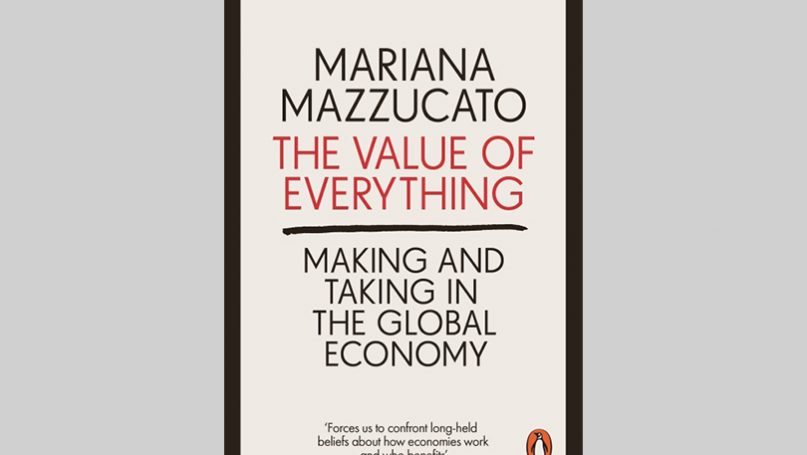
The Value of Everything
By Mariana Mazzucato
Penguin, 2019
In 2019, David Graeber wrote, “the language of public debate, and the wisdom conveyed in economic textbooks, remain almost entirely unchanged.” While this statement is largely true, one cannot discount the depth and flexibility a more eclectic, international political economy approach brings to the broader scholarship on economics. Mariana Mazzucato has managed to further the development of a quite static and rather impenetrable field.
The Value of Everything provides an interrogation of the concept of ‘value’ in various theoretical schools. With an eclectic view on the economy, Mazzucato constructs a complex configuration of value creation beyond the tangible. The work is organized through a discussion of value in three sectors: finance (actors in this sector get rich by capturing value from other sectors), innovation (characterized by cumulativeness, uncertainty and collectiveness (p.191)), and government. The understanding of the role of government – typically viewed as an unproductive sector – is challenged quite convincingly. This organization, as well as the initial decision to emphasize these sectors and characterize them as Mazzucato does, reflects influences of Schumpter (innovation emphasis), Keynes (discussion of role of government), and Marx (concerns of distribution).
The concept that multiple theories may co-exist in our minds is clearly exemplified by Mazzucato. Believers in Keynesian economics and its policy framing want the state to keep a watchful eye on markets in order to be fixers of imperfections. Mazzucato is a more radical kind of Keynesian – and therefore capitalist – that is willing to subject markets to more broad critiques than her theoretical peers. While she is critical of the way modern capitalism prioritizes the accumulation or ownership of assets, the tendency of capitalism to push towards shareholder systems (the author thinks government could reign this in), the proliferation of public-private partnerships and patents morphing into things that prevent competition, Mazzucato really believes capitalism can work given particular parameters. Her argument would benefit from deeper interrogation of structural bias and power dynamics within the institutions, like the government, she places so much faith in.
The entry point for Keynesian economic theory is structure, which influences human behavior. This is reflected in Mazzucato’s emphasis on the need for changes in the institutions and mechanisms of understanding and influencing value creation; however, she also recognizes that Marx gave capital a social dimension. For example, in discussing the various theories of economics, Mazzucato notes the Marxists’ ability to “[link] profits to a notion of sacrifice [which] allowed a useful moral justification for the large income inequality between capitalists and workers” (p.59).
In The Value of Everything, Mazzucato dedicates quite a bit of time to the phenomena of financialization. She writes that “asset management has grown into one of capitalisms defining characteristics” (p.151). The United States has entered a period of capitalism where financialization thrives despite its questionable productivity; it is socially useless but does, as noted by Mazzucato, increase capacity for value extraction. Mazzucato is concerned with the reality of today’s capitalism in which value extraction is more highly valued than value creation. She asserts that “on the basis of contemporary economic consumption, we can no longer reliably say who creates value and who extracts it and therefore how the proceeds of production – income – should be distributed” (p. 71) which supports her push for a new theory of value. The importance of labelling and the need for a new intersubjective understanding of value permeates the book.
A defining and unique aspect of this work is the interrogation of the role of government. No economic theory addresses government in the way and to the extent Mazzucato does in this work. She crafts a narrative of government as a co-creator and co-shaper of markets – as more than just a fixer. One way she supports this is through an analysis of the important role the public sector plays in value creation. While this portion of the book is strong, her argument seems to weaken as readers near the end. She writes that we need to find ways to assess value created by the public sector (p.267). However, it is not clear how this is to be done. Normative shifts in the labeling of value are an important step, but there must also be material calculations. How do we move towards adopting a new value theory nationally? Globally?
In The Value of Everything, Mazzucato alluded to – or directly reflects on – the connection between economic and social structures. While, as David Graeber has said, “there is a growing feeling, among those who have the responsibility of managing large economies, that the discipline of economics is no longer fit for purpose,” this work is proof that heterodox theories have relevant and important things to say. Traditional Keynesian economic theory assumes a certain level of sophistication of governments, it seems to me that one could use Mazzucato’s push for a rethinking of government’s role in relation to value creation to enhance that position. I appreciate the constructivist underpinnings in many of the discussions presented in the book, and, while no one economic, social, or political theory gets it all right and readers are left grasping for possible solutions, I think there is merit in the more complex interrogations of “given” concepts that Mazzucato engages in.
I recommend this book to anyone with whom that last statement resonates. The Value of Everything is quite theoretical and may be best suited for students and scholars of political economy rather than strictly practitioners in the field of finance. That being said, the work is an important contribution to broadening the conversation about value in the global market and would be of interest to readers looking to expand their ability to think and talk about a redefining of the role of government in value creation and extraction.